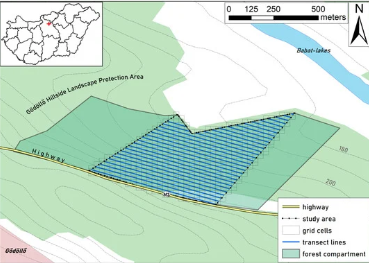- Authors: Natalia Pitta-Osses, Centeri Csaba, Fehér Ádám, Katona Krisztián
- Publication: 05.08.2022 FORESTS 13 : 8 Paper: 1234 , 15 p. (2022)
- MTMT Identifier: 33091048
Abstract: Forest soils are shaped by various processes, like runoff, erosion, sedimentation and bioturbation. A better understanding of the interactions between abiotic and biotic soil-forming processes, including wild boar (Sus scrofa) rooting (i.e., subsurface foraging), enhances adequate management of forest ecosystems. We hypothesized that intense soil sedimentation influences wild boar rooting occurrence and that wild boars modify the outcome of the sedimentation process by redistributing soil layers. This study was conducted in the Babat Valley, Hungary. We estimated the availability of sedimented and non-sedimented patches and the occurrence of boar rooting. Surveys and samplings were done along transects, over consecutive months, where the impact of rooting on the physical and chemical characteristics of soil was measured by comparing them between control and rooted sites. We found that non-sedimented, steep areas were preferred areas for rooting. Sedimentation processes have a higher impact on soil chemical characteristics and soil layer composition than wild boar rooting. We conclude that mitigation of soil degradation can be more effective by reducing adverse abiotic processes rather than wild boar population control.



